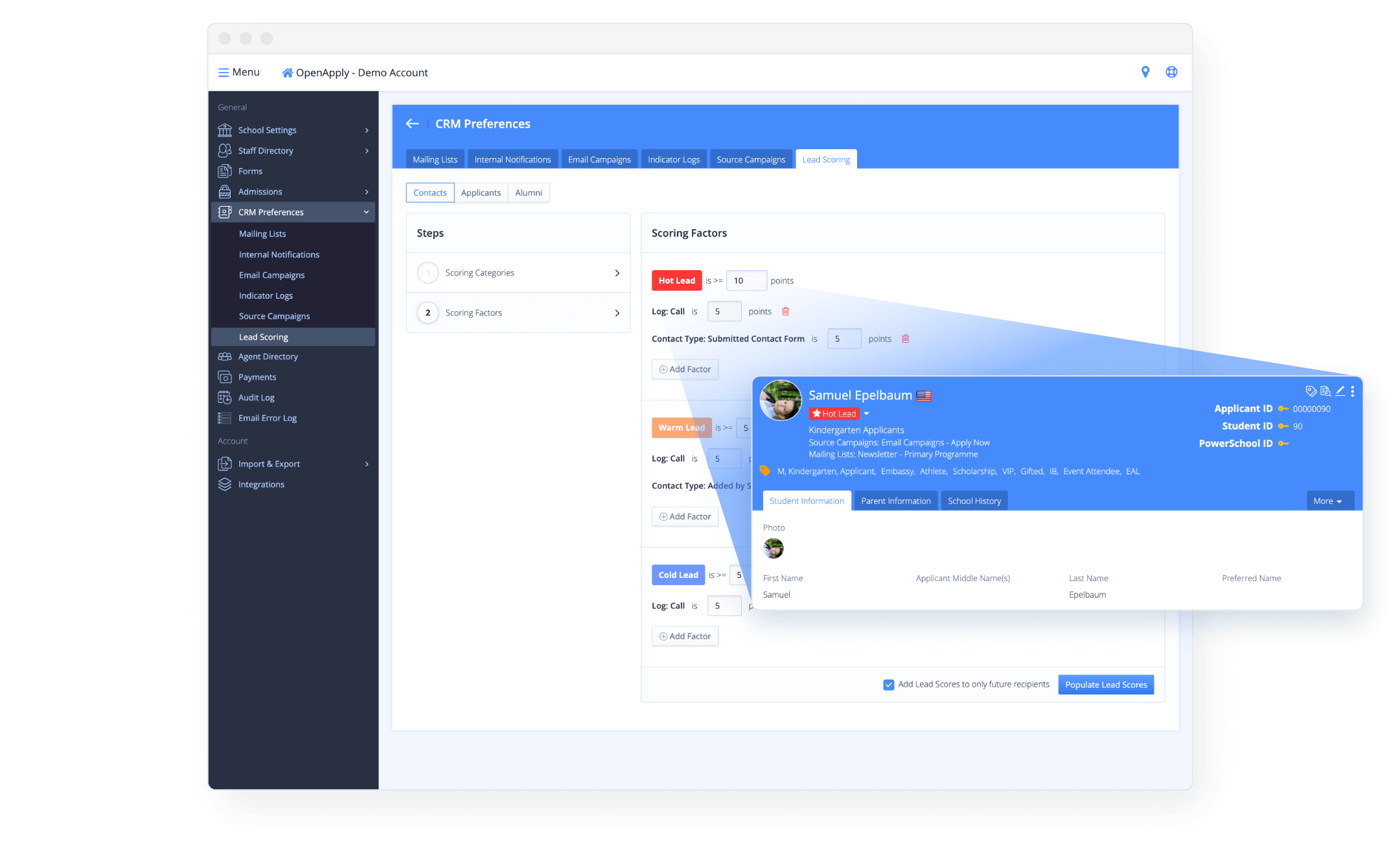Meticulous lead scoring plays a highly impactful role in the competitive international and independent school markets, in terms of identifying and prioritising prospective students and families. Robust admissions CRMs allow schools to capitalise on valuable engagement data, streamline their enrolment processes and optimise their marketing efforts accordingly.
However, despite the obvious advantages of automated lead scoring (learn more in our previous blog post), there are instances where manual assignment of lead scores becomes indispensable. In this blog, we will further delve into the significance of lead scoring, highlight some limitations of relying solely on automatic assignment, and discuss the unique circumstances where manual intervention is preferable.
The Role of Lead Scoring in International Schools
Lead scoring is a strategic process that empowers international schools to effectively prioritise their engagement with prospective students and families. By assigning scores based on predefined criteria, schools can efficiently allocate resources, personalise communication, and nurture relationships.
A comprehensive CRM system can automate this process, assigning numerical values or scores to various attributes and behaviors of prospective families, such as their demographic information, engagement with school marketing materials, and other critical milestones throughout the enquiry and application process.
By quantifying the engagement and behavior of prospective families, lead scoring assists international schools in identifying and nurturing families throughout the admissions process, optimising resource allocation and increasing the overall efficiency of the admissions and marketing process.
For international schools managing enquiries from diverse countries and accommodating students with varied educational backgrounds, lead scoring is invaluable as it allows the school to assess each prospective family's engagement, preferences, and potential fit. This aids in tailoring communications and information to their specific needs, addressing concerns related to curriculum transitions, language proficiency, and cultural adjustments. By quantifying the level of interest and alignment with the school's offerings, lead scoring streamlines the enrollment process, enabling the school to focus resources on families more likely to thrive within their unique academic environment and adapt successfully to the international school’s curriculum.
Limitations of Automatic Lead Scoring
While automatic lead scoring provides numerous benefits, it is important to recognise its limitations. Some prospective students may exhibit exceptional qualities or circumstances that cannot be adequately captured by automated algorithms alone. These limitations can include:
Non-Digital Lead Sources - International schools often encounter prospective families through in-person channels such as conferences, events, or personal referrals. These leads may not meet traditional thresholds, but their explicit expression of keen interest in applying and enrolling in the school must be captured, measured and actioned appropriately.
Individualised Needs - Each prospective student has unique requirements and circumstances that may not be evident through automated criteria. Personalised discussions and interactions can provide valuable insights into a student's specific educational needs, allowing for better matching between the student and the school's offerings.
The Importance of Manual Assignment
In the aforementioned circumstances, manual assignment of lead scores becomes invaluable. Human intervention allows schools to consider qualitative factors that automated systems and scoring algorithms may not take into consideration. Here are a few scenarios where manual assignment is preferable:
 High-Value Prospects
High-Value Prospects
Whilst automatic lead scoring may rank prospective families based on predetermined criteria, manually assigning scores allows international schools to highlight right-fit prospects with an extremely high likelihood of enrolling. For instance, meeting a prospective family at a conference, who align with the school’s missions and vision, and where they explicitly express keen interest in sending their children to your school, should become a high priority for the admissions team. Striking this delicate balance between automated scoring and personalised assessment allows international schools to make more informed decisions and effectively prioritise their efforts in nurturing promising students and families.
 Special Considerations
Special Considerations
Some prospective students may have unique talents, backgrounds, or circumstances that automated systems cannot fully contextualise. In such cases, manual assignment of lead scores enables schools to recognise and prioritise these exceptional candidates appropriately.
 Relationship Building
Relationship Building
Personal interactions and conversations provide valuable context that automated algorithms often won’t capture. By manually assigning lead scores, schools can acknowledge the significance of building face-to-face relationships and investing time in nurturing leads that show great potential but may not meet predetermined criteria.
 Balancing Automation and Human Expertise
Balancing Automation and Human Expertise
In the pursuit of effective lead scoring, schools must strike a balance between automation and human expertise. Combining the power of a robust CRM system with the insights provided by manual assignment can yield optimal results. Ultimately, leveraging technology to streamline the process, can help schools to automate routine lead scoring tasks while reserving manual intervention for exceptional circumstances.

Lead scoring plays an important role in the admissions, marketing and advancement initiatives of international and independent schools. While automated systems provide efficiency and scalability, they should be supplemented with manual assignment in exceptional circumstances. By recognising the limitations of automation and valuing the importance of personal interactions, schools can ensure a holistic and effective lead scoring approach. OpenApply, an all encompassing system that interconnects school admissions, marketing and advancement, can empower your team to optimise their student recruitment and retention efforts by combining automated algorithms with their existing human expertise. Schedule a free demo to learn more!
